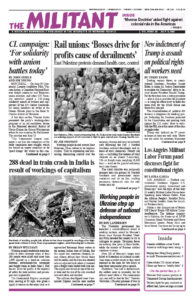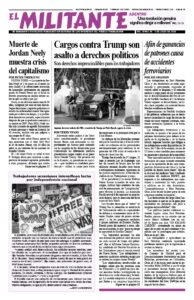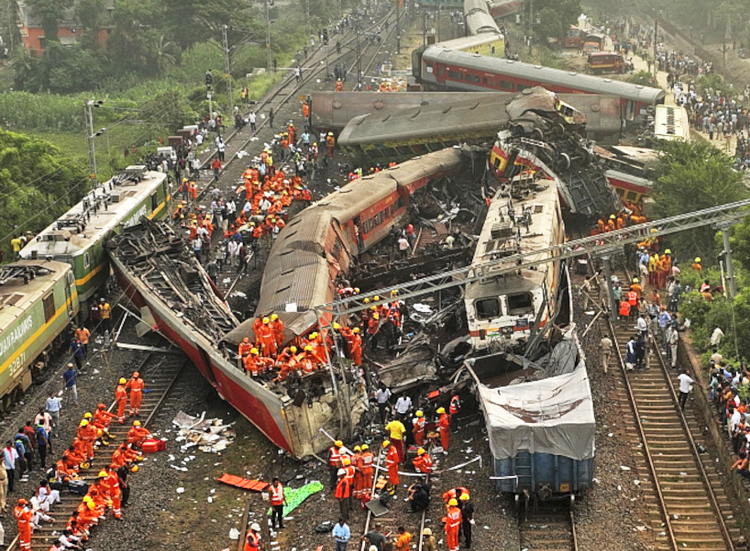Working people worldwide were horrified at news coverage when at least 288 people were killed and more than 1,000 injured in a head-on collision between government-run passenger and freight trains in India June 2. Rail bosses’ drive for profits at the expense of safety for train workers and passengers was responsible.
The Coromandel Express passenger train, moving at 80 mph, was given a signal to remain on the main track as it approached Bahanaga Bazar station in the eastern Indian state of Odisha. But this signal was somehow changed, senior railway official Jaya Verma Sinha told the media, and the train was shunted onto an adjacent track where it rammed into a freight train loaded with iron ore. The engine was tossed on top of the other train and the rest of the cars smashed into each other and derailed.
The collision also flipped some Coromandel Express coaches onto another adjacent track, causing the incoming Yesvantpur-Howrah Superfast Express traveling in the opposite side to hit them and derail. Nearly 2,300 passengers were riding on the two trains.
Rail officials claim the crash was caused by a problem with the electronic signaling system, saying they’ll determine whether this was a “technical or human” error. Whenever possible, rail bosses look to blame crew members for crashes and absolve themselves.
The disdain of the government and its rail bosses for train workers and passengers was in full view. Almost all of the 288 dead had been packed in three unreserved general coaches at the front of the train, where workers are crammed standing shoulder to shoulder, with chains hanging from the roof to try and hang onto.
Unlike the 1,200 passengers in air-conditioned reserved seats, the rail service had no record of the identities of those in the general cars. In fact, officials said only two of the dead identified so far came from reserved coaches. There was no way for relatives and friends to know if loved ones were on the train and whether they survived.
“They were all people like me, poor,” Rahul Kumar, a 28-year-old carpenter who had been in one of the Coromandel general coaches, told the New York Times. “Daily wage workers, laborers and people who can’t afford a ticket in the next compartment.”
Passengers who survived told reporters the number of deaths far exceeded the government’s tally. Nearly 100 of those killed remain in the morgue, the Times reported June 11, unidentified and unclaimed.
Trains are a key method of transport in India, carrying millions of workers to jobs. Of the 20 million daily passengers, six out of seven hold unreserved tickets, particularly on suburban runs.
There are nearly 20,000 rail-related deaths yearly, many from falling out of overcrowded cars or being hit by a train at unprotected crossings.
The rail bosses moved quickly to get train service going again, in less than 48 hours, moving mangled rail cars off to the side and laying new track over the derailment site.
Workers volunteer to save lives
In contrast to the government and rail management, working people in the area volunteered and did everything they could to try to save lives. Deepak Behera was playing football in the nearby town of Bahanaga when the crash occurred. He and other local residents rushed to the area in total darkness, using flashlights on their mobile phones to search for survivors. “The carriages were so badly turned and crashed that nobody was capable of getting out,” he told CNN, adding that he pulled 28 people alive from the carriages, and bodies of others who had died.
This latest crash and the dangerous conditions on India’s capitalist rulers’ rail system are rooted in their insatiable demand for profits. The country has one of the largest and oldest rail networks, with decrepit infrastructure. Nearly all of India’s rail lines — 98% of 67,000 miles of tracks — were built between 1870 and 1930 under British colonial rule.
Prime Minister Narendra Modi’s government, in a drive to modernize the rail system to take in more money, has promoted big investments for station upgrades and fancy new high-speed trains, but little is allocated to repair the tracks.
A report published last year by India’s Comptroller and Auditor General said that of the more than 1,100 derailments it examined between fiscal 2018 and fiscal 2021, over one-third were caused by track maintenance issues. It also said track workers are overworked, with overly long shifts.
This will sound all too familiar to rail workers in the U.S.


